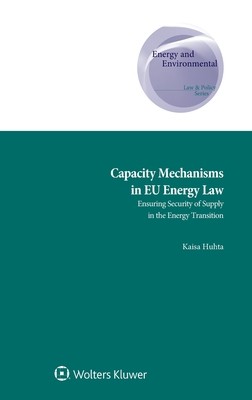
- Išsiųsime per 10–14 d.d.
- Autorius: Kaisa Huhta
- Leidėjas: Kluwer Law International
- ISBN-10: 9403514515
- ISBN-13: 9789403514512
- Formatas: 16 x 24.6 x 2 cm, kieti viršeliai
- Kalba: Anglų
- Extra -15 % nuolaida šiai knygai su kodu: ENG15
Atsiliepimai
Aprašymas
Many states - including European Union (EU) Member States - subsidise energy producers in order to guarantee the uninterrupted availability of affordable electricity. This book presents the first in-depth examination of how these so-called capacity mechanisms are addressed in EU law and how they affect the functioning of the EU energy markets.
Focusing on the existing legal framework as well as the new provisions of the Clean Energy for All Europeans package for capacity mechanisms, the author addresses and analyses such aspects as the following:
- the structure and functioning of the EU electricity markets;
- EU's competence to address security of supply and Member States' margin of discretion;
- sector-specific rules for security of supply;
- legal conditions for subsidising generation adequacy;
- capacity remuneration under the EU State aid regime;
- free movement rules that address generation adequacy measures;
- balancing different interests of EU energy law in the context of generation adequacy; and
- the requirement of proportionality in State intervention to ensure generation adequacy.
The analysis draws on relevant sources of EU law (treaties, regulations and directives) as well as the case law of the European Court of Justice and the General Court, together with soft law instruments such as Commission guidelines. Scholarly sources include not only legal literature but also work on energy policy, energy engineering and energy economics.
As a detailed analysis of how capacity mechanisms address issues arising in the context of the enegy transition - and how the system of EU law applicable to capacity mechanisms should be interpreted to further the objectives of EU energy law - the book will help policymakers and legislators in Member States to understand the changing legal setting for capacity mechanisms. Lawyers, academics and other professionals who deal with EU electricity markets in the EU and beyond are sure to welcome its detailed description and analysis.
EXTRA 15 % nuolaida su kodu: ENG15
Akcija baigiasi už 07:18:53
Nuolaidos kodas galioja perkant nuo 10 €. Nuolaidos nesumuojamos.

- Autorius: Kaisa Huhta
- Leidėjas: Kluwer Law International
- ISBN-10: 9403514515
- ISBN-13: 9789403514512
- Formatas: 16 x 24.6 x 2 cm, kieti viršeliai
- Kalba: Anglų
Many states - including European Union (EU) Member States - subsidise energy producers in order to guarantee the uninterrupted availability of affordable electricity. This book presents the first in-depth examination of how these so-called capacity mechanisms are addressed in EU law and how they affect the functioning of the EU energy markets.
Focusing on the existing legal framework as well as the new provisions of the Clean Energy for All Europeans package for capacity mechanisms, the author addresses and analyses such aspects as the following:
- the structure and functioning of the EU electricity markets;
- EU's competence to address security of supply and Member States' margin of discretion;
- sector-specific rules for security of supply;
- legal conditions for subsidising generation adequacy;
- capacity remuneration under the EU State aid regime;
- free movement rules that address generation adequacy measures;
- balancing different interests of EU energy law in the context of generation adequacy; and
- the requirement of proportionality in State intervention to ensure generation adequacy.
The analysis draws on relevant sources of EU law (treaties, regulations and directives) as well as the case law of the European Court of Justice and the General Court, together with soft law instruments such as Commission guidelines. Scholarly sources include not only legal literature but also work on energy policy, energy engineering and energy economics.
As a detailed analysis of how capacity mechanisms address issues arising in the context of the enegy transition - and how the system of EU law applicable to capacity mechanisms should be interpreted to further the objectives of EU energy law - the book will help policymakers and legislators in Member States to understand the changing legal setting for capacity mechanisms. Lawyers, academics and other professionals who deal with EU electricity markets in the EU and beyond are sure to welcome its detailed description and analysis.




Atsiliepimai